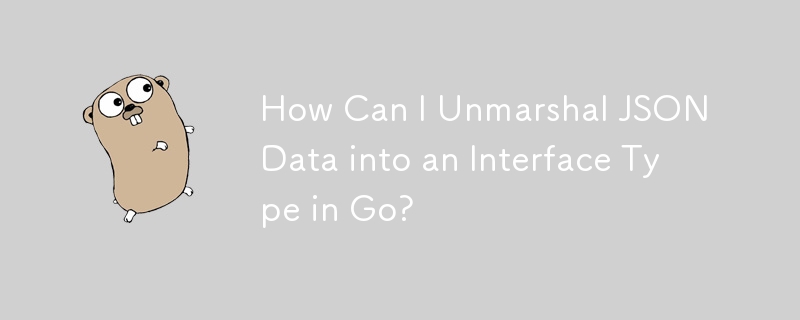Home >Backend Development >Golang >How Can I Unmarshal JSON Data into an Interface Type in Go?
How Can I Unmarshal JSON Data into an Interface Type in Go?
- Barbara StreisandOriginal
- 2024-12-20 09:22:11691browse

Unmarshal to an Interface Type
In RPC, marshalling to an interface type is straightforward since the object is local and the reflector can identify its underlying type. However, unmarshalling to an interface type presents a challenge.
The reflector cannot determine the concrete type to assign to the new instance that will receive the marshaled data. This limitation applies to all marshalling/unmarshalling operations.
To resolve this issue in some frameworks, additional information is provided to assist the reflector. For example, in Java Json(jackson), the JsonTypeInfo annotation specifies the class type.
In Go, implementing the Unmarshaler interface for your custom type can address this challenge. Consider the following example:
import (
"encoding/json"
"errors"
"fmt"
"log"
)
// RawString is a raw encoded JSON object.
// It implements Marshaler and Unmarshaler and can
// be used to delay JSON decoding or precompute a JSON encoding.
type RawString string
// MarshalJSON returns *m as the JSON encoding of m.
func (m *RawString) MarshalJSON() ([]byte, error) {
return []byte(*m), nil
}
// UnmarshalJSON sets *m to a copy of data.
func (m *RawString) UnmarshalJSON(data []byte) error {
if m == nil {
return errors.New("RawString: UnmarshalJSON on nil pointer")
}
*m += RawString(data)
return nil
}
const data = `{"i":3, "S":{"phone": {"sales": "2223334444"}}}`
type A struct {
I int64
S RawString `sql:"type:json"`
}
func main() {
a := A{}
err := json.Unmarshal([]byte(data), &a)
if err != nil {
log.Fatal("Unmarshal failed", err)
}
fmt.Println("Done", a)
}The above is the detailed content of How Can I Unmarshal JSON Data into an Interface Type in Go?. For more information, please follow other related articles on the PHP Chinese website!
Related articles
See more- Why Doesn\'t Go Have Inheritance?
- Why Does fmt.Printf Output \'-101\' for a Signed Integer Represented in Two\'s Complement?
- How to Create a Context in Go that Doesn't Cancel?
- Can You Get a `reflect.Type` from a String Name in Go?
- Why does my Go regex code throw an 'invalid or unsupported Perl syntax: (?!'' error?

